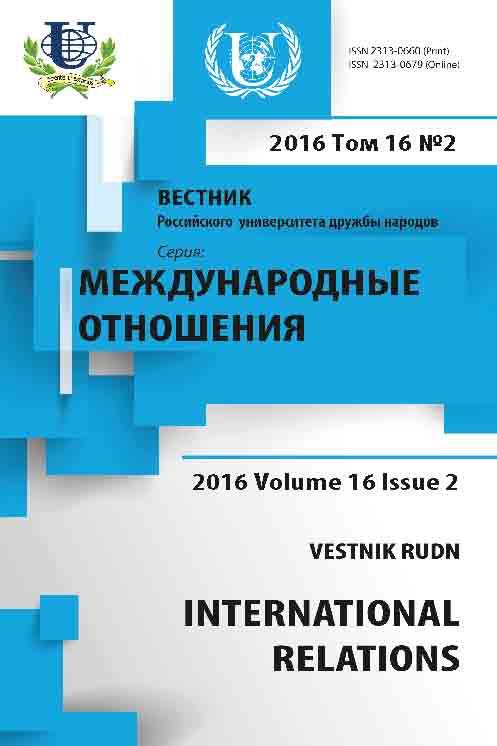Российско-африканские отношения на новом старте
- Авторы: Корендясов Е.Н.1
-
Учреждения:
- Институт Африки РАН
- Выпуск: Том 16, № 2 (2016): Африка в системе международных отношений
- Страницы: 203-214
- Раздел: СТАТЬИ
- URL: https://journals.rudn.ru/international-relations/article/view/14269
- ID: 14269
Цитировать
Полный текст
Аннотация
Возвращение России в Африку широко обсуждается в отечественных и зарубежных научно-экспертных кругах, на страницах газет и журналов. При этом затрагивается широкий круг проблем странового, регионального и глобального масштабов, выдвигаются и высказываются противоречивые оценки и суждения. За рубежом достаточно активно продвигается трактовка «возвращения» России на континент как новое направление «неоимперских амбиций» новой России, ее стремлений ослабить позиции Запада, «подзолотить» свой имидж в развивающихся странах, в глазах африканцев. В предлагаемой вниманию читателей статье анализируется влияние формирующихся политико-экономических и социальных реалий XXI в. на перспективы развития Африканского континента вообще и на российско-африканские отношения в частности. Автор приходит к выводу, что повышение роли и веса континента в мировой политике и экономике уже сегодня требует переосмысления российских подходов к проблемам расширения масштабов российско-африканского партнерства и формирования его долгосрочной концепции с опорой на имеющиеся политико-дипломатические и инвестиционно-финансовые ресурсы стран. Утверждающаяся новая динамика российско-африканских отношений связана, в первую очередь, с развитием партнерства в тех областях и по тем направлениям, где Россия обладает конкурентным потенциалом, производственными мощностями, высокими компетенциями и опытом. К таковым сегодня можно отнести освоение природных ресурсов, атомную и гидроэнергетику, военно-техническое сотрудничество, создание спутниковых информационно-коммуникативных систем, сотрудничество в сфере образования, здравоохранения, в борьбе с эпидемиями, природными катастрофами. Россия достаточно уверенно преодолевает спад отношений с Африкой, зарегистрированный в конце 80-х и в 90-е гг. XX столетия. Однако было бы преждевременным утверждать, что полноценное «возвращение» России на континент уже состоялось. Расширение масштабов всестороннего сотрудничества в первую очередь будет зависеть, во-первых, от устойчивости и качества ускорения развития Африки, трансформации африканских экономик на современных индустриальных и технологических основах; а, во-вторых, от динамики социально-экономического и общественно-политического развития российского государства. Интересы Африки все заметнее смещаются в сторону Юга. Ее возможности ослабить критическую зависимость от Запада возрастают. Россия, наряду с другими участниками БРИКС, может внести в развитие этого процесса столь же впечатляющий вклад, какой был сделан в достижение целей Движения неприсоединения и Организации африканского единства. Истории, действительно, повторяются, но на другом витке развития.
Ключевые слова
Об авторах
Евгений Николаевич Корендясов
Институт Африки РАН
Автор, ответственный за переписку.
Email: ekorendyasov@yandex.ru
Москва, Россия
Список литературы
- Абрамова И.О., Фитуни Л.Л. Экономическая глобализация и проблемы национальной и международной безопасности // Проблемы современной экономики. 2013. № 3. С. 96-100
- БРИКС-Африка: партнерство и взаимодействие. Отв. ред. Т. Дейч, Е. Корендясов. М., 2013
- Дейч Т.Л. Региональная политика БРИКС в Африке // Вестник международных организаций. 2015. Т. 10. № 2. сс. 206-224
- Корендясов Е.Н. БРИКС и Африка: потенциал партнерства и взаимодействия // БРИКС-Африка: партнерство и взаимодействие. Отв. ред. Т. Дейч, Е. Корендясов. М., 2013. сc. 48-75
- Перспективы и стратегические приоритеты восхождения БРИКС. Под ред. В.А. Садовничего, Ю.В. Яковца, А.А. Акаева. М.: HKИ БРИКС. 2014. сс. 154-155
- African Economic Outlook 2015. Regional Development and Spatial Inclusion. African Development African Economic Outlook 2015. Regional Development and Spatial Inclusion. African Development Bank, Organization for Economic Co-operation and Development, United Nations Development Programme, 2015
- Arbache J. Is Africa’s Economy at a Turning Point? The World Bank. Research Working Paper 4519. African Region. February 2008
- Global Investments Trends Monitor. The Rise of BRICs FDI and Africa, 2013. Special Edition. 25 March 2013. United Nations Conference on Trade and Development
- Lions go digital: The internet's transformative potential in Africa. McKinsey Global Institute, November 2013
- World Investment Report 2015. Reforming International Investment Governance. United Nations Conference on Trade and Development, 2015
- World Investment Report 2014. Investing in the SDGs: An Action Plan. United Nations Conference on Trade and Development, 2014
Дополнительные файлы










